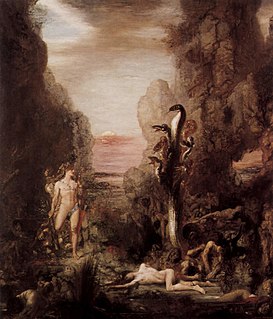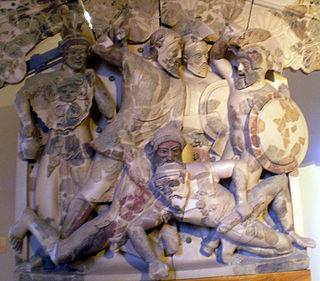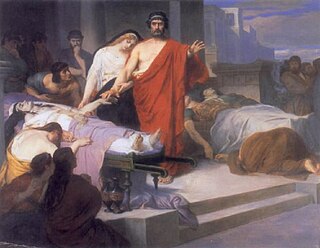External links
| Wikiquote has quotations related to: Frederick Ahl |
Frederick M. Ahl (born 1941) is a professor of classics and comparative literature at Cornell University. [1] He is known for his work in Greek and Roman epic and drama, and the intellectual history of Greece and Rome, as well as for translations of tragedy and Latin epic.
Ahl studied classics at Cambridge University, where he received bachelor's and master's degrees, and at the University of Texas, where he received his doctorate.
He taught at the Texas Military Institute, Trinity University, the University of Texas at Austin, and the University of Utah before he joined the Cornell faculty in 1971.
Ahl recorded messages in Ancient Greek, Latin, and Welsh for the Voyager Golden Record that was included with the launch of both Voyager spacecraft in 1977.
He was awarded the Clark Award for Distinguished Teaching by Cornell in 1977 and a fellowship by the National Endowment for the Humanities in 1989-90 and was a Stephen H. Weiss Presidential Fellow in 1996. In 1996–99 and 2000–01 he taught Literature (Attic Tragedy) and Classical Languages as visiting professor at College Year in Athens, a study abroad program in Athens. He has served as director of Cornell Abroad in Greece.
In 2013 Ahl was honored with a conference at Cornell entitled Speaking to Power in Latin and Greek Literature, and in 2016 with a related festschrift, Wordplay and Powerplay in Latin Poetry. [2]
He is active in theater in Ithaca, including Cornell Savoyards' Gilbert and Sullivan productions.
In addition to his several books, Ahl has published articles on topics including ancient Greek music, Homeric narrative, rhetoric in antiquity, and Latin poetry of the Roman imperial period.
In 1985 Ahl published Metaformations: Soundplay and Wordplay in Ovid and Other Classical Poets. [2] In his 1991 book Sophocles' Oedipus: Evidence and Self-Conviction, he argues that the Oedipus of Sophocles' play is not actually guilty; Oedipus' conclusion that he is guilty is not actually confirmed by the information in the play itself, and the audience's belief in Oedipus' guilt is based on the audience's outside knowledge of the myth. [3]
In 2007, Ahl published a translation of Virgil's Aeneid into English hexameter, which was republished in paperback in 2008. He is the editor of the series of translations under the rubric "Masters of Latin Literature".
| Wikiquote has quotations related to: Frederick Ahl |
Latin literature includes the essays, histories, poems, plays, and other writings written in the Latin language. The beginning of Latin literature dates to 240 BC, when the first stage play was performed in Rome. Latin literature would flourish for the next six centuries. The classical era of Latin literature can be roughly divided into the following periods: Early Latin literature, The Golden Age, The Imperial Period and Late Antiquity.

Tisiphone, or Tilphousia, was one of the three Erinyes or Furies. Her sisters were Alecto and Megaera. She and her sisters punished crimes of murder: parricide, fratricide and homicide.
In Greek mythology, Adrastus or Adrestus, , was a king of Argos, and leader of the Seven against Thebes. He was the son of the Argive king Talaus, but was forced out of Argos by his dynastic rival Amphiaraus. He fled to Sicyon, where he became king. Later he reconciled with Amphiaraus and returned to Argos as its king.

The Nemean lion was a vicious monster in Greek mythology that lived at Nemea. It was eventually killed by Heracles. It could not be killed with mortals' weapons because its golden fur was impervious to attack. Its claws were sharper than mortals' swords and could cut through any armor. In Bibliotheca, Photius write that the dragon Ladon who guarded the golden apples, was his brother.

In Greek mythology, the Erymanthian boar was a mythical creature that took the form of a "shaggy" "tameless" "boar" "of vast weight" "and foaming jaws". It was a Tegeaean, Maenalusian or Erymanthian boar that lived in the "glens of Lampeia" beside the "vast marsh of Erymanthus". It would sally from the "thick-wooded", "cypress-bearing" "heights of Erymanthus" to "harry the groves of Arcady" and "abuse the land of Psophis".

The Lernaean Hydra or Hydra of Lerna, more often known simply as the Hydra, is a serpentine water monster in Greek and Roman mythology. Its lair was the lake of Lerna in the Argolid, which was also the site of the myth of the Danaïdes. Lerna was reputed to be an entrance to the Underworld, and archaeology has established it as a sacred site older than Mycenaean Argos. In the canonical Hydra myth, the monster is killed by Heracles (Hercules) as the second of his Twelve Labors.

Oedipus Rex, also known by its Greek title, Oedipus Tyrannus, or Oedipus the King, is an Athenian tragedy by Sophocles that was first performed around 429 BC. Originally, to the ancient Greeks, the title was simply Oedipus (Οἰδίπους), as it is referred to by Aristotle in the Poetics. It is thought to have been renamed Oedipus Tyrannus to distinguish it from another of Sophocles's plays, Oedipus at Colonus. In antiquity, the term "tyrant" referred to a ruler with no legitimate claim to rule, but it did not necessarily have a negative connotation.

Robert Stuart Fitzgerald was an American poet, critic and translator whose renderings of the Greek classics "became standard works for a generation of scholars and students". He was best known as a translator of ancient Greek and Latin. He also composed several books of his own poetry.

Robert Fagles was an American professor, poet, and academic, best known for his many translations of ancient Greek and Roman classics, especially his acclaimed translations of the epic poems of Homer. He taught English and comparative literature for many years at Princeton University.

In ancient Roman religion and myth, Tellus Mater or Terra Mater is a goddess of the earth. Although Tellus and Terra are hardly distinguishable during the Imperial era, Tellus was the name of the original earth goddess in the religious practices of the Republic or earlier. The scholar Varro (1st century BC) lists Tellus as one of the di selecti, the twenty principal gods of Rome, and one of the twelve agricultural deities. She is regularly associated with Ceres in rituals pertaining to the earth and agricultural fertility.

Ancient Greek literature is literature written in the Ancient Greek language from the earliest texts until the time of the Byzantine Empire. The earliest surviving works of ancient Greek literature, dating back to the early Archaic period, are the two epic poems The Iliad and The Odyssey, set in an idealized archaic past today identified as having some relation to the Mycenaean era. These two epics, along with the Homeric Hymns and the two poems of Hesiod, Theogony and Works and Days, comprised the major foundations of the Greek literary tradition that would continue into the Classical, Hellenistic, and Roman periods.

The Theban Cycle is a collection of four lost epics of ancient Greek literature which tells the mythological history of the Boeotian city of Thebes. They were composed in dactylic hexameter verse and believed to be recorded between 750 and 500 BC. The epics took place before the Trojan War and centered around the Theban royal family.
The Thebaid is a Latin epic in 12 books written in dactylic hexameter by Publius Papinius Statius. The poem deals with the Theban cycle and treats the war of the Seven against Thebes, who were seven champions who led an Argive army against the city of Thebes.
Kathleen M. Coleman is an academic and writer who is the James Loeb Professor of the Classics at Harvard University. Her research interests include Latin literature, history and culture in the early Roman Empire, and arena spectacles. Her expertise in the latter area led to her appointment as Chief Academic Consultant for the 2000 film Gladiator.
Rush Rehm is Professor of Drama and Classics at Stanford University, California, in the United States. He also works professionally as an actor and director. He has published many works on classical theatre. Rehm is the artistic director of Stanford Repertory Theater (SRT), a professional theater company that presents a dramatic festival based on a major playwright each summer. SRT's 2016 summer festival, Theater Takes a Stand, celebrates the struggle for workers' rights. A political activist, Rehm has been involved in Central American and Cuban solidarity, supporting East Timorese resistance to the Indonesian invasion and occupation, the ongoing struggle for Palestinian rights, and the fight against US militarism. In 2014, he was awarded Stanford's Lloyd W. Dinkelspiel Award for Outstanding Service to Undergraduate Education.
Elaine Fantham was a British-Canadian classicist whose expertise lay particularly in Latin literature, especially comedy, epic poetry and rhetoric, and in the social history of Roman women. Much of her work was concerned with the intersection of literature and Greek and Roman history. She spoke fluent Italian, German and French and presented lectures and conference papers around the world—including in Germany, Italy, the Netherlands, Norway, Argentina, and Australia.

Oedipus is a fabula crepidata of c. 1061 lines of verse that was written by Lucius Annaeus Seneca at some time during the 1st century AD. It is a retelling of the story of Oedipus, which is better known through the play Oedipus Rex by the Athenian playwright, Sophocles. It is written in Latin.
Shlomo Dykman was a Polish-Israeli translator and classical scholar.

Philip Russell Hardie, FBA is a specialist in Latin literature at the University of Cambridge. He has written especially on Virgil, Ovid, and Lucretius, and on the influence of these writers on the literature, art, and ideology of later centuries.

Helen V. Lovatt is Professor of Classics at the University of Nottingham. She is known in particular for her work on Latin epic literature especially from the Flavian period.